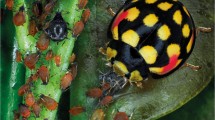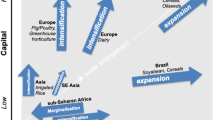Abstract
Traditional Central American peasant farmers know more about some aspects of the local agroecosystem than about others. In general farmers know more about plants, less about insects, and less still about plant pathology. Without discounting economic factors, ease of observability must explain part of this difference. Certain local beliefs may affect what farmers observe and know. For example, a belief in spontaneous generation may lead people to fail to observe insect reproduction. The implications of the gaps in farmer knowledge are discussed in terms of the sustainable agriculture movement.
Similar content being viewed by others
References Cited
Altieri, Miguel. A., “Desarrollo de Estratégias para el Manejo de Plagas por Campesinos, Basándose en el Conocimiento Tradicional,”CIRPON—Revista de Investigación. 2 (3–4, 1984) 151–164.
Altieri, Miguel A.,Agroecology: The Scientific Basis of Alternative Agriculture. Boulder: Westview, 1987.
Andrews, Keith L., “The Whorlworm,Spodoptera frugiperda, in Central America and Neighboring Areas,”Florida Entomologist. 63 (1980) 456–467.
Andrews, Keith L., “Latin American Research onSpodoptera frugiperda (Lepidoptera: Noctuidae),”Florida Entomologist. 71 (4, 1988): 630–63.
Bentley, Jeffery W., “Economic and Ecological Approaches to Land Fragmentation: In Defense of a Much-Maligned Phenomenon,”Annual Review of Anthropology. 16 (1987): 32–63.
Bentley, Jeffery W., “Pérdida de Confiananza en Conocimiento Tradicional como Resultado de Extensión Agrícola entre Campesinos del Sector Reformado en Honduras,”Ceiba. 36 (2, 1989).
Bentley, Jeffery W., “?Qué es Hielo? Percepciones de los Campesinos Hondureños sobre Enfermedades del Frijol y Otros Cultivos.” Submitted toInterciencia, in press.
Bentley, Jeffery W.,El Léxico Agroecológico de Honduras. El Zamorano, Honduras: Escuela Agrícola Panamericana, Department of Plant Protection. In preparation.
Berlin, B., D. E. Breedlove, and P. H. Raven.Principals of Tzeltal Plant Classification: An Introduction to the Botanical Ethnography of a Mayan-Speaking People of Highland Chiapas. New York: Academic Press, 1974.
Chambers, Robert.Rural Development: Putting the Last First. New York: Wiley and Sons, 1983.
Conelly, W. Thomas. “Perception and Management of Crop Pests Among Subsistence Farmers in South Nyanza, Kenya” in J. Tait, D. Bottrell and B. Napometh, eds.,Pests, Pesticides and Integrated Pest Management. Boulder: Westview Press, 1987.
Conklin, Harold C.,Hanunoo Agriculture, a Report on an Integral System of Shifting Cultivation in the Philippines. Rome: FAO, 1957.
Curran, C. H., “Insect Lore of the Aztecs,”Natural History. 39 (1937) 196–203.
Farrington, John, “Farmer Participatory Research: Editorial Introduction,”Experimental Agriculture. 24 (3, 1988) 269–279.
Granatstein, David.Reshaping the Bottom Line: On-Farm Strategies for a Sustainable Agriculture. Stillwater, Minnesota: Land Stewardship Project, 1988.
Hanway, J. J., “Corn Plant Development.” MS. Department of Agronomy, Iowa State University, no date.
Hoppe, T., “Storage Insects of Basic Food Grains in Honduras,”Tropical Science. 26 (1986): 25–38.
Howes, Michael and Roberts Chambers, “Indigenous Technical Knowledge: Analysis, Implications, and Issues.” In David W. Brokensha, D. M. Warren and Oswald Werner (eds.)Indigenous Knowledge Systems and Development. Lanham, Maryland: University Press of America, 1980.
Hunn, Eugene, “The Utilitarian Factor in Folk Biological Classification,”American Anthropologist. 84 (1982) 830–47.
Johnson, Allen W.,Sharecroppers of the Sertāo: Economics and Dependence on a Brazilian Plantation. Stanford: Stanford University Press, 1971.
Leach, Edmund.Pul Eliya: A Village in Ceylon. Cambridge: Cambridge University Press, 1968.
Leonard, H. Jeffrey.Natural Resources and Economic Development in Central America: A Regional Environmental Profile. New Brunswick: Transaction Books, 1987.
Netting, Robert M., “Agrarian Ecology,”Annual Review of Anthropology. 3 (1974) 21–56.
Netting, Robert M.Balancing on an Alp: Ecological Change and Continuity in a Swiss Mountain Community. New York: Cambridge University Press, 1981.
Page, W. W. and P. Richards, “Agricultural Pest Control by Community Action: The Case of the Variegated Grasshopper in Southern Nigeria,”African Environment. 2 & 3 (1977) 127–141.
Pimentel, David and Nancy Goodman, “Ecological Basis for the Management of Insect Populations,”Oikos. 30 (1978) 422–437.
Richards, Paul, “Community Environmental Knowledge in African Rural Development,” in David W. Brokensha, D. M. Warren and Oswald Werner (eds),Indigenous Knowledge Systems and Development. Lanham, Maryland: University Press of America, 1980.
Richards, Paul, “Farming Systems and Agrarian Change in West Africa,”Progress in Human Geography. 7 (1983, 1) 1–39.
Ritchie, Steven W. and John J. Hanway.How A Corn Plant Develops. Ames: Iowa State Univ. Cooperative Extension Service, 1984.
Rivas, Pedro Geoffory.La Lengua Salvadoreña. San Salvador: Ministerio de Educación, 1978.
Rosch, Eleanor, “Principles of Categorization,” in Eleanor Rosch and Barbara B. Lloyd, Editors,Cognition and Categorization. Hillside, New Jersey: Lawrence Earlbaum Associates, 1978.
Schwartz, H. and G. Gálvez (eds.).Problemas de Producción: Enfermedades, Insectos, Limitaciones Edáficas y Climáticas de Phaseolus vulgaris. Cali, Columbia: CIAT, 1980.
Steward, Julian.Theory of Culture Change. Urbana: University of Illinois Press, 1955.
Tait, E. J., “Pest Control Decision Making on Brassica Crops,”Advances in Applied Biology. Vol 8: 121–188. London: Academic Press, 1983.
Thrupp, Lori Ann, “Pesticides and Policies: Approaches to Pest Control Dilemmas in Nicaragua and Costa Rica,”Latin American Perspectives. 15 (4, 1988): 37–70.
Wilken, Gene C., “Integrating Forest and Small-Scale Farm Systems in Middle America,”Agro-Ecosystems. (3, 1977) 291–302.
Additional information
Jeffery W. Bentley (Ph.D. cultural anthropology, University of Arizona 1986) has done field work with the Tohono O'odham (formerly the Papago) of Arizona, and in northwest Portugal. After teaching anthropology at New Mexico State University, he joined the Plant Protection Department of the Escuela Agrícola Panamericana (El Zamorano, Honduras) in 1987. He has published several articles in anthropological journals, and has a book in press on small-scale Portuguese farming. He is currently studying the agroecological knowledge and the agricultural practices of Honduran peasant farmers.
Rights and permissions
About this article
Cite this article
Bentley, J.W. What farmers don't know can't help them: The strengths and weaknesses of indigenous technical knowledge in Honduras. Agric Hum Values 6, 25–31 (1989). https://doi.org/10.1007/BF02217666
Issue Date:
DOI: https://doi.org/10.1007/BF02217666




